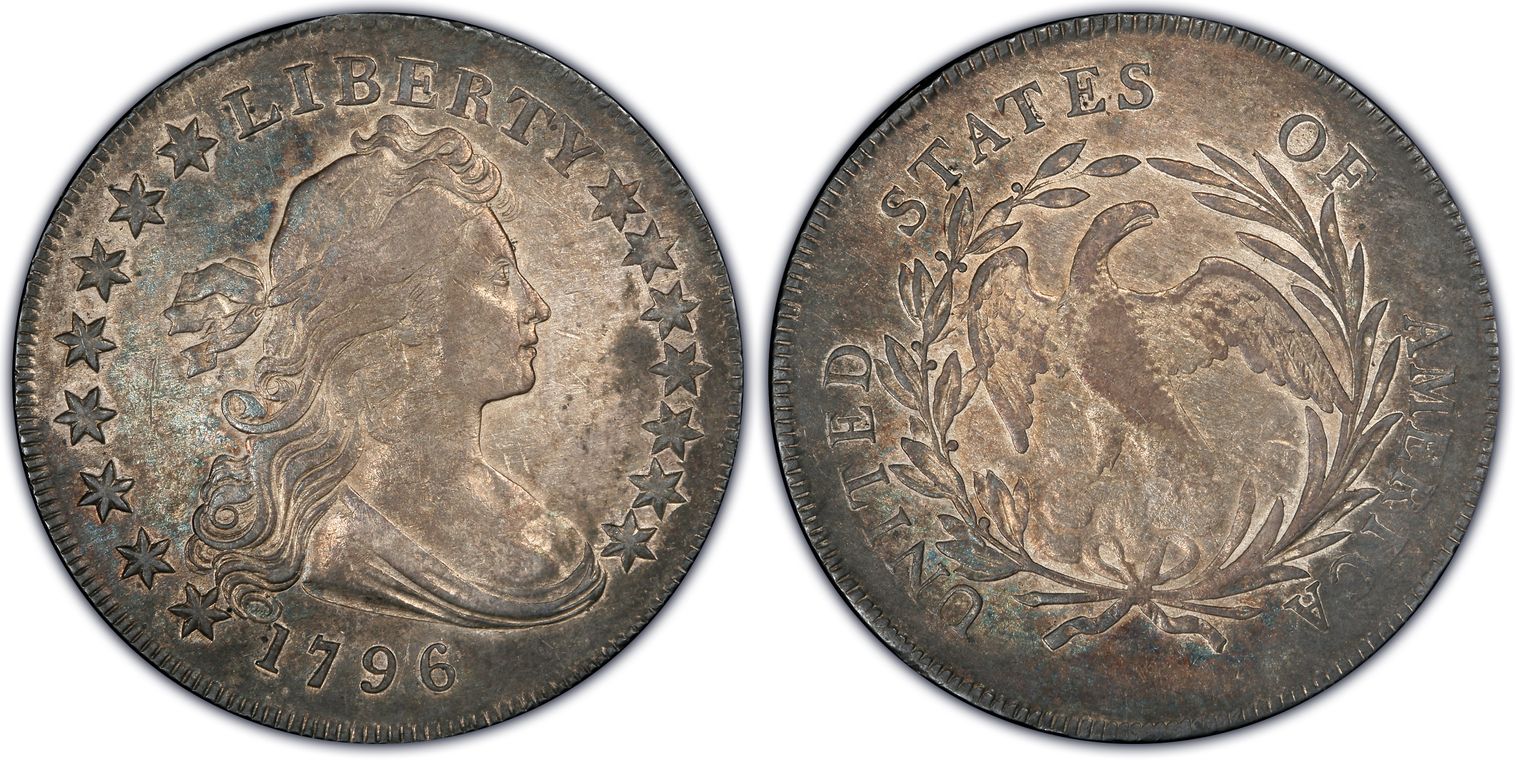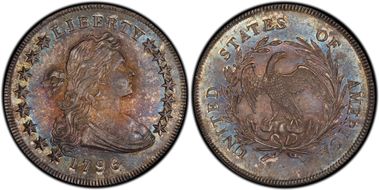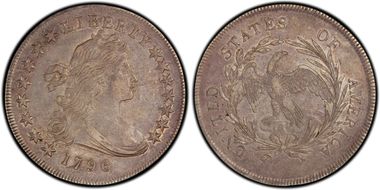1796 $1 BB-63, Small Date & Letters VF35 认证号16294744, PCGS号39998
拥有者评论
CAC
专家评论
Q. David Bowers
The following narrative, with minor editing, is from my "Silver Dollars & Trade Dollars of the United States: A Complete Encyclopedia" (Wolfeboro, NH: Bowers and Merena Galleries, Inc., 1993). Note: the Notable Specimens list should be used with caution - it has been updated in my 2013 edition of "The Encyclopedia of United States Silver Dollars 1794-1804."B-2. H-2.
OBVERSE 2: Small wide date; all of the figures of date evenly spaced wide apart. 6 leans to the left. Highest wave of hair under serif at left bottom of E; second highest wave under upright of R. End of hair tress touches only one (the innermost) point of star 1. The curly lock closest to the date barely misses the star point to the right of the innermost point of star 1 (magnification may be necessary to tell this: on BB-66, the curly lock touches not only the tip of the innermost point of star 1, but also the point to the right of it). On BB-63, star 1 points to the space between two denticles (on BB-66 it points to a denticle). A point of star. 15 points to the middle of the drapery folds (on BB-66 it points to a spot high on the drapery folds). This obverse bears a close resemblance to the obverse of BB-66, and specimens sh6hld be compared to it. The R in LIBERTY shows beginning signs of failure at the lower right tip. Of the four 1796 obverses, this die was cut next to the last.
Obverse die used to strike 1796 BB-63 (earlier use) and BB-64 (later use).
REVERSE B: Described under 1795 BB-51, herewith repeated: Small Eagle. Small Letters in legend. Eagle stands on clouds. Wreath is composed of a palm branch (right) and olive branch (left), the latter with seven berries. A short, prominent die scratch extends up to left from tip of right, inside leaf below (observer's) left wing. Berry under A of STATES; a quick way to identify this reverse. Weakly detailed at center.
Reverse die used to strike 1795 BB-51; 1796 BB-62, BB-63, and BB-66 (now relapped); 1797 BB-72; and 1798 BB-81.
DIE STATES:
Die State I: Perfect dies. Reverse die state the same as used on 1795 BB-51; no lapping yet (compare to die states of 1796 BB-66) .. This is the only die state seen by the author. This is the same reverse die state as used to coin 1796 BB-62.
Die State II: Reverse die relapped, removing. some details of the shallowest (lowest) folds in the wreath ribbon and removing about 50% of the lowest left leaf on the wreath Gust below the U of UNITED). This die state was also. used to coin 1797 BB-72 and 1798 BB-82. May not exist with 1796 BB-63.
COLLECTING NOTES: An estimated 175 to 300 specimens exist of 1796 BB-63, another variety that is usually seen in lower grades. Above VF, acquisition becomes a challenge. Specimens are scarce if EF and very rare if AU. The typical example of 1796 BB-63 is not as well struck as 1796 BB-66, and is apt to show weakness at the lower center of the reverse at the eagle's tail and feet.
Centering may be irregular, but only slightly so. For example, a coin may be perfectly centered on the reverse, but have the obverse very slightly off center to the top (making the denticles very prominent at the bottom of the obverse, and weak at the top); or, conversely, a specimen may be well centered on the obverse, but have the reverse very slightly off center to the top (making the denticles very prominent at the bottom of the obverse, and weak at the top).
NOTABLE SPECIMENS:
Eastern Specimen. MS-60. Specimen in a private eastern collection, MS-60 (reported by Douglas Winter).
Newcomer Specimen. AU-55 . Waldo C. Newcomer. Col. E.H.R. Green . James G. Macallister . T. James Clarke Collection, New Netherlands 48th Sale, 1956: 616. "AU-55, only a shade from Mint State. Struck a bit off-center, with pink, blue, lavender and gold patina."
Carter Specimen. AU-50 . Amon Carter, Jr. Collection, Stack's, 1984: 214 .. "AU and a beauty with some prooflike surface. Lovely pale russet toning with iridescence about the edges."
GENA Convention Specimen. AU-50. Kagin's, GENA Convention Sale, 1979: 367. "With lovely blue lustre. Sharp strike with center points of stars visible."
Hollinbeck-Kagin Specimen. AU-50 Hollinbeck-Kagin Sale, June 1970: 599. "Nearly Uncirculated."
Metropolitan Washington Convention Specimen. EF-45 . Kagin's Metropolitan Washington Convention Sale, 1975: 535. "Choice EF, sharp strike with deep dentilation around both edges, glittering bluish golden patina, traces of original lustre."
ANA Convention Sale Specimen. EF-40 Steve Ivy, ANA Convention Sale, 1982: 710. "Gently cleaned at one time now retoned a natural steel gray."
CSNS Convention Sale Specimen. EF-40 . Kagin's CSNS Convention Sale, 1979: 358. "EF-40, nice strike and original golden grayish color."
DeCoppet Specimen. EF-40 Andre DeCoppet Collection,James F. Kelly, 1955 . AJ. Ostheimer, 3rd Collection, Lester Merkin, 1968: 238. "EF, central areas weakly and unevenly struck, obverse full of adjustment marks; mint lustre with much iridescent gray and blue toning."
Newcomb Specimen. EF-40 . Howard R. Newcomb Collection . Dr. Charles Green Collection, B. Max Mehl, 1949: 1978 . Harold Bareford Collection, Stack's, 1981: 407. "EF with some prooflike surface. Struck slightly off center at 6:00. Deep iridescent toning."
The Autumn Sale Specimen. EF-40 . Stack's Autumn Sale, 1986: 4898. "Somewhat softly struck, with plenty of detail. A few old scratches near reverse rim just to right of bow. Surfaces still retain some mint 'flash' and exhibit attractive antique grayish violet toning."
Ullmer Specimen. EF-40. Ullmer Sale, Stack's, 1974: 226 . March Sale, Stack's, 1983: 926, "EF and a superb specimen. Pale russet-gray toning. Sharply struck, with the slightest wear on the bust and leg of the eagle."
Gross Specimen. EF-40 . Yolanda Gross Collection. Purchased from JJ. Teaparty in June 1985.
Ron Guth
Bruce Morelan, in an interview with PCGS in 2016, spoke about his Finest Known PCGS MS65 example: “The 1796 is just an amazing, original coin. Never seen anything like it. Most of the 1796s are drab; they have been impaired, lightly cleaned. This coin displayed original envelope toning. I flew to Chicago to buy this coin. My wife and I were at the Bulls playoff game, and I'm standing in the stairwell, yelling bids to Laura as this coin's going off. It sold for well over $1 million — at the time, a world record for a Bust Dollar, let alone a 1796.”
PCGS #
39998
设计师
Robert Scot/John Eckstein
边缘
Lettered: HUNDRED CENTS ONE DOLLAR OR UNIT
直径
40.00 毫米
重量
27.00 克
铸币数量
79920
金属成分
90% Silver, 10% Copper
更高评级数量
2
评级较低的钱币数量
7
地区
The United States of America
价格指南
PCGS 数量报告
拍卖 - PCGS 评级的
拍卖 - NGC 评级的






















